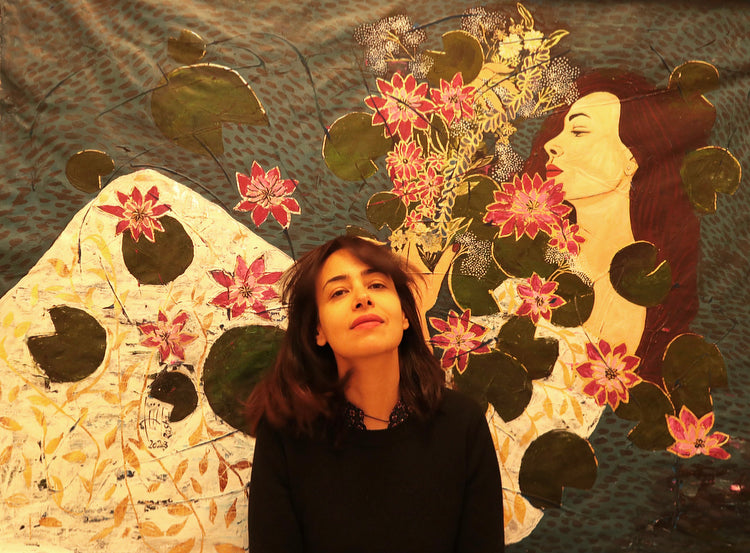
Share
Rasha Amin on Art, Identity, and the Power of Metamorphosis
The Egyptian-born, Rome-based multidisciplinary artist reflects on cultural transition, creative reinvention, and finding strength through solitude and storytelling.
Meeting Rasha Amin is like stepping into a dynamic conversation that traverses continents, cultures, and creative forms. Born in Cairo, and now rooted in Rome after a stint in the rural South of Italy, this multidisciplinary artist embodies a quiet intensity shaped by displacement, solitude, and reinvention. Her work, spanning painting, video, and mixed media, is a testament to her adaptability, resilience, and, above all, her commitment to transformation.

"Any living artist translates and reinterprets their environment through their lens," she says, "shaping new narratives based on personal experience and perception." And for Rasha, that lens has shifted dramatically over the years. Cairo's visual and emotional density gave way to the slowed-down stillness of Southern Italy, where she moved just before the COVID-19 pandemic. "That sense of void," she reflects, "especially intensified during lockdown, gave me the space to listen inward." In that silence, a new voice emerged — one that would carry her into the most pivotal work of her career to date.
That voice took form in Metamorphosis, a body of work that straddles the realms of the folkloric and the futuristic. Inspired by the fantastical worlds of One Thousand and One Nights, as well as her Egyptian and Turkish roots, the series features surreal, empowered creatures — part myth, part mirror. "During a time of isolation and uncertainty," she explains, "these symbols became more than just references. They transformed into metaphors for survival, resilience, and transformation." Similarly, her next major work, Rebirth, is a meditation on arrival. Created after moving to Rome, Rebirth explores what it means to enter a new space—physically, emotionally, and culturally. It's a project that reflects her personal and artistic evolution, as well as her growing understanding of the power of art to bridge cultures and experiences.

But Metamorphosis is not about nostalgia. It's about reimagining. "I wasn't interested in simply retelling ancient stories," she adds. "I wanted to reshape them to reflect my journey." The creatures that populate her work are guardians of a kind — fierce, soft, spectral — embodiments of the power she needed to access during her period of crisis. In this way, Rasha's art becomes both personal spellwork and shared mythology.
Her practice is equally defined by its fluidity of form. From painting and photography to experimental video, Rasha lets the idea lead the way. "Each medium has its language," she says. "Painting lets me explore texture and colour. Video allows me to work with motion, time, and sound. The medium is never chosen randomly — it responds to the project's needs." For an artist so deeply attuned to emotional states, this kind of formal adaptability feels essential. "What excites me," she continues, "is the freedom to experiment. It allows me to stretch, to stay curious."

This ethos was particularly evident in her project Missing Company, conceived during the early pandemic years. "It took shape during a profound period of solitude," she recalls. "The absence of others became deeply felt. In that stillness, imagination became both a sanctuary and a way to navigate the silence." The result is a visual poem — raw, tender, and haunting — about longing and the unseen interiorities of human experience. Rasha's art, a vital act of presence, transformed loneliness into something significant, resonating with the audience on an emotional level.
If Metamorphosis was a confrontation with solitude, then her next major work, Rebirth, is a meditation on arrival. Created after moving to Rome, Rebirth explores what it means to come into a new space — physically, emotionally, and culturally. "Nature played a key role in that transition," Rasha says. "The slowness of rural life, the rhythm of the seasons, and the silence of solitude became mirrors for my internal shifts." Immersed in a new landscape, she began to notice small details again — light, texture, breath — and these elements infused her work with new attentiveness and emotional clarity.
Rome offered its challenges. While the city is steeped in history and tradition, Rasha noticed a distinct difference in the creative ecosystem compared to Cairo. "In Egypt, there's a raw urgency — artists often feel compelled to experiment, to invent with limited resources. In Rome, the pace is slower, and the art scene can lean more traditional." Navigating these two creative worlds — the experimental and the established — meant finding her rhythm. "The biggest challenge was finding space for my voice," she says. "But that contrast sharpened my identity. The tension between these cultures became generative."
Perhaps this in-betweenness — the refusal to settle into a single mode or identity — is what defines her most. In 2022, Rasha founded an NGO dedicated to bridging cultures through art. This initiative, still in its early stages, reflects her conviction that artists are not only creators but also translators of human experience. The NGO is a manifestation of her desire to use art as a tool for" building bridges beyond borders and words. It's not just a project, but a part of her artistic journey that influences her practice and teaching. It's about collaboration, listening more attentively, and seeing creation as a dialogue.
That word —"dialogue — seems to capture the essence of her creative universe. Rasha is not an artist who speaks from a pedestal. Her work is relational, textured by place, history, and a deep well of feeling. And it is ever-changing. "Transformation has always been at the heart of both my life and my practice," she says. "Each phase of change brings with it a new way of seeing. I try to remain open to that shift." This openness and relatability in her art create a sense of shared experience and connection with the audience.
She describes her process as a "living organ "sm" — something that grows, sheds, and renews with each new chapter. "I let the materials, the concepts, and the environment speak back to me. I don't try to do or predict the outcome. I trust the process, even when it feels uncertain." In an age obsessed with stability and definition, Rasha Amin offers something else entirely: an art of fluidity, of becoming, of listening in the dark.
And when it's time, she tunes into a soundscape as layered as her practice. "In Egypt, I "grew up listening to Fairuz, Abdel Halim, and Angham. After moving to Italy, I was drawn to classic Italian voices, such as Mina. I also listen to a lot of classical jazz. And depending on the mood — Sam Smith, Dua Lipa, Billie Eilish." The playlist", like the artist, holds multitudes.
Listen to Rasha's Playlist
As our conversation comes to a close, I ask her what's next. She smiles, and with the quiet certainty of someone who has weathered many metamorphoses, she says, "I don't know." "Exdon't." But I know I'll keep changing."

